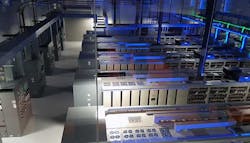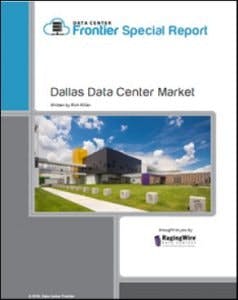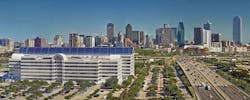Dallas Data Center Development Suggests Confidence in Future Demand
We continue our series of stories on the leading geographic markets for data center space. Data Center Frontier is partnering with DatacenterHawk to provide in-depth market reports on each city we profile. The following is the third post in a four-part series, and focuses on Dallas data center market development and trends in supply.
Download the full report.
Trends in Supply
The data center development activity in the Dallas region suggests growing confidence in the future growth of demand in the Greater Dallas market. As we noted in our overview, datacenterHawk is tracking 570 MW of additional capacity in the planning stages in the Dallas market. Only Northern Virginia (900 MW) and Greater Phoenix have more capacity in the planning stages.
It’s important to note that the majority of the active developers in Dallas are experienced operators who know the market and have experience with phased construction projects that manage capital (and risk) as they bring new capacity to market.
This is clearly seen in the wave of wholesale campuses that are either underway or in the planning stages in the northern suburbs of Dallas. RagingWire, Digital Realty, CyrusOne, EdgeCore, Compass, Stream and Skybox all have multi-building campuses underway. Meanwhile, T5 and IPI are planning a 400 MW project in Fort Worth.
The Dallas region data center development capacity is spread across several sub-markets, including major carrier hotels in downtown Dallas, a nexus of wholesale data centers in the “Telecom Corridor” in Richardson, Plano, Garland and Allen. These northern suburbs are emerging as key to the region’s data center supply, offering more land for the multi-building campuses that developers covet.
Here’s a look at how the supply in the DFW Metroplex breaks down:
Downtown Dallas
The value of data center property in Downtown Dallas was clearly established with Equinix’s $800 million purchase of the Infomart building (1.6M SF), the premier carrier hotel and data hub. Equinix made the acquisition at approximately $500/SF. For comparison purposes, GI Partners purchased the One Wilshire building for $659 per square foot in 2013.
The Infomart deal represents not only Equinix’ largest footprint in the region but the primary interconnectivity hub for the Southwest. The Infomart houses multiple data center operators with retail colocation environments, as well as several large office tenants. The purchase provides Equinix with control of the real estate supporting their growth (something they previously did not have), as well as the ability to expand with a new building next to the current facility.
The Equinix Infomart, with the Dallas skyline behind it. (Photo: Equinix).
Expansion plans were developed by Infomart’s previous ownership, but Equinix has the capability to deploy capital more aggressively to capture growth opportunities. This brings a new dynamic to the Downtown market, where the other leading players are the Digital Realty carrier hotel at 2323 Bryan Street (also known as the Univision Tower), and the DataBank building, the former Federal Reserve Bank site at 400 South Akard. Digital Realty owns the building, where the primary tenant is Digital Bridge, which acquired DataBank (the service provider) in 2016. DataBank has focused its expansion efforts on the Dallas suburbs.
Northern Suburbs
There is a building boom going on in the suburbs, led by large REITs specializing in data center development. These companies have acquired large buildings, campuses and parcels of land, providing them with plenty of runway to expand over time through phased construction. This approach allows them to add capacity to keep pace with market demand, limiting the scope of speculative development.
There’s an intriguing new player in town in EdgeCore, a new wholesale provider led by former CoreSite CEO Tom Ray, and backed by GIC, the sovereign wealth fund for the government of Singapore.
EdgeCore is preparing to build on a 33-acre site in the east end of Richardson, in close proximity to the RagingWire and Digital Realty campuses in Garland. The EdgeCore campus is designed to accommodate five buildings and an on-site substation. Each facility will include two main data halls, totaling approximately 180,000 SF and 32 MW of commissioned power operating at a PUE of 1.25 or better.
New players with big plans can sometimes be disruptive to a market, creating the potential for oversupply or pricing wars. Ray’s experience at CoreSite offers some reassuring history that the EdgeCore team understands these market dynamics.
Other Projects in the Northern Suburbs
The data center development activity in the Dallas region suggests growing confidence in the future growth of demand in the Greater Dallas market. (Photo: Aligned Data Centers)
Digital Realty continues to build out its 70-acre Digital Dallas campus in Richardson, with eight buildings completed and more on the way. Much of the space at Data Center Park-Dallas has been leased by cloud computing service providers. The newest phase is a multi-story 340,000 square foot structure that will use at least 24 of Digital’s turn-key data center halls (known as “pods”). Digital Realty has also procured land in Garland for a $1 billion, 150 MW campus featuring three 50 MW data centers.
- RagingWire Data Centers has completed the first of five interconnected data centers (a 230,000 SF facility called the TX1 Data Center, designed for large scale deployments) that it has planned for its new 42-acre Garland campus. Each data center will offer 16 MW of capacity, for a total of 80 MW across 1 million SF. RagingWire is owned by NTT, which has the financial strength, and the credit rating, to play at scale.
- CyrusOne purchased land in Allen in 2Q 2017 with grand plans – the campus can hold three buildings and provide up to 99 MW of commissioned power. The site provides CyrusOne with development runway, and the realistic ability to serve both enterprise and hyperscale customer requirements. The first 79,000 SF of commissioned space and 6 MW of commissioned power is set to go live in 2Q 2018. CyrusOne is also leasing at the final phase of its huge facility in Carrollton.
- Stream Data Centers has acquired 23 acres in Garland for a new campus that will support 400,000 square feet of space, commencing with a 140,000 SF first phase.
- DataBank recently delivered the first data hall in their Plano Legacy facility, which adds 1.5 MW of commissioned power to the available market. DataBank purchased the facility from Stream in 2Q 2017, and is now marketing the site. The facility will support 9 MW when fully delivered.
- QTS Data Centers also has plenty of room to grow in the DFW market. The QTS Dallas facility in Las Colinas is a 700,000 square foot former semiconductor fab, with an 8 MW installation by a large cloud provider. The company has the ability to add as many as three additional buildings on the property.
- Compass Datacenters has completed the first data center on its campus in Allen, with capacity for several more. The facility is occupied by Tierpoint.
In Plano, Aligned Data Centers is continuing to fill the first phase of a planned 30-megawatt facility, while Skybox Data Centers has completed and leased the first building on its Legacy One campus. Equinix opened its DA7 colocation facility in March, and Ascent just announced a new wholesale data center.
It’s anticipated that pricing will remain aggressive in the DFW market given the amount of supply and new companies that are entering the market.
Fort Worth
Fort Worth is about 30 miles West of Downtown Dallas, and has emerged as a sub-market to watch in the wake of Facebook’s decision to build a data center campus in the Alliance Gateway business park. Facebook announced its plans in 2015, and has gradually expanded its ambitions. The company now plans five data center buildings, which will make Fort Worth one of its largest U.S. data center campus.
As often happens, other data center projects have followed. In early 2017, QTS Data Centers announced the acquisition of a Health Care Service Corporation data center immediately north of the Facebook campus through a sale-leaseback. The QTS property has space to construct another 300,000 SF and 60 MW of data center space on the 53-acre property.
In October 2017, T5 Data Centers announced plans for a 400-megawatt project distributed across parcels of land north of the Facebook site. T5@Alliance is being created by T5 and IPI Data Center Partners, an investment fund backed by the deep pockets of Silicon Valley wealth management firm Iconiq and Iron Point Partners. The project will occupy at least 350 acres within the AllianceTexas business park operated by Hillwood and the Perot family.
The availability of renewable energy options is crucial to the DFW region’s aspirations to emerge as a player in hyperscale deals. Facebook’s Fort Worth data center campus is supported by 200 MW of wind power generated in Clay County.
Over the next few weeks, the Data Center Frontier series on the Dallas Data Center Market will cover the following topics for the region:
- Market Overview & Analysis
- Trends in Demand
- Business Environment
Download the full Data Center Frontier “Dallas Data Center Market” special report, courtesy of RagingWire Data Centers.
And for further coverage, check out Data Center Frontier’s page dedicated to the Dallas Data Center Market, that will provide the latest stats and info on this quickly growing area that is continuing to experience a data center boom.
About the Author




